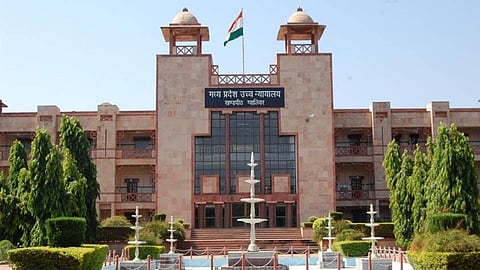

BHOPAL: The Madhya Pradesh High Court has set aside an Indore family court’s February 8, 2025 order which denied relief to Jain couples seeking divorce by mutual consent under Section 13B of the Hindu Marriage Act 1955.
On February 8, the First Additional Principal Judge Family Court-Indore Dhirendra Singh had refused multiple Jain couples relief under Section 13B of the Hindu Marriage Act (which deals with divorce by mutual consent). The family court while returning the divorce applications of the Jain couples had held that "followers of Jainism don’t have any right to get relief under the Hindu Marriage Act 1955, as they have rejected the basic Vedic beliefs of Hinduism and have established themselves as minorities after separating from Hindu religion since 2014.”
Hearing one of the petitions filed against the family court’s order, the MP High Court’s double judge bench in Indore, comprising Justices Sushrut Arvind Dharmadhikari and Sanjeev S Kalgaonkar, set aside the family court judge’s order.
“The family court judge has committed grave illegality and manifested impropriety in concluding that the provisions of the Hindu Marriage Act 1955 are not applicable to the members of Jain community. The impugned order is set aside and the appeal of the parties allowed. The First Additional Principal Judge Family Court, Indore is directed to proceed with the petition in accordance with law,” the HC stated in its order while hearing the petition filed by one of the aggrieved Jain couples.
While accepting the appeal against the family court’s order, the HC stated, “The central government in exercise of powers conferred by Clause (c) of Section 2 of the National Commission for Minorities Act, 1992 notified the Jain community as a minority community in addition to five communities already notified as minority communities viz. Muslims, Christians, Sikhs, Buddhists and Zoroastrians (Parsis) for the purpose of the said Act. Though this notification recognises Jain community as a minority community, it does not amend, invalidate or supersede express provision of any existing laws. No corresponding amendments have been made to exclude the members of the Jain community from application of an existing law.”
“The founders of the Constitution of India and the Legislature in their collective wisdom have integrated the Hindus, Buddhists, Jains and Sikhs for application of the Hindu Marriage Act. Both the parties had pleaded that they married according to Hindu rituals and customs. There was no occasion for the Additional Principal Judge to substitute his own views and perceptions against the express provisions of the law. If the concerned Court was satisfied that the case pending before it involves a question as to operability of provisions of the Hindu Marriage Act to the members of Jain community, it could have referred the case for opinion of High Court under the proviso to Section 113 of the Code of Civil Procedure, 1908 read with Section 10 of the Family Courts Act, 1984,” the HC observed in its order.
In the 14-page order on Monday, the HC’s Indore Bench further observed, “Present day society is fragmented on religion, caste, sects, origin and language. The Additional Principal Judge attempted to find out the differences between the religious practices of followers of Hindu religion and that of the Jain community, to bolster his conclusion that religious practice and customs especially regarding marriage are distinguishable. However, the practices stated in the impugned order itself show that the marriage rituals performed by followers of both the communities are generally similar. The learned Additional Principal Judge ought to have applied the explicit legal provisions to the matter under consideration rather than engaging in scholarly interpretation of rituals and practices of the Jain community.”
The Hindu Marriage Validity Act, 1949 was passed to validate all the existing marriages between Hindus, Sikhs and Jaina and their different castes, sub castes and sects. Section 2 of the Act defines “Hindu” as including the persons professing Sikh or Jain religion. Section 3 of the said Act explicitly states that no marriage between Hindus, including Sikh and Jain, shall be deemed invalid by virtue of any other existing law, interpretation, text, rule, custom or usage. 11/ Thereafter, the Hindu Marriage Act was passed on May 18 1955. It is an Act to amend and codify the law relating to marriage among Hindus.
“Thus, the provisions of Hindu Marriage Act are applicable to all the persons, who are Buddhist, Jain or Sikh by religion. The Sub-section (3) of Section 2 fortifies the applicability of Hindu Marriage Act to the members of Jain community. These express provisions of the law were unfortunately not considered in the correct perspective by the learned Additional Principal Judge,” the HC maintained.
As many as 28 couples had reportedly approached the MP High Court in Indore after the family court had passed identical orders, denying them relief, in a single day on February 8.
While looking into the controversy involved in the case, the HC had appointed Indore-based senior advocate AK Sethi as amicus curiae to assist it.